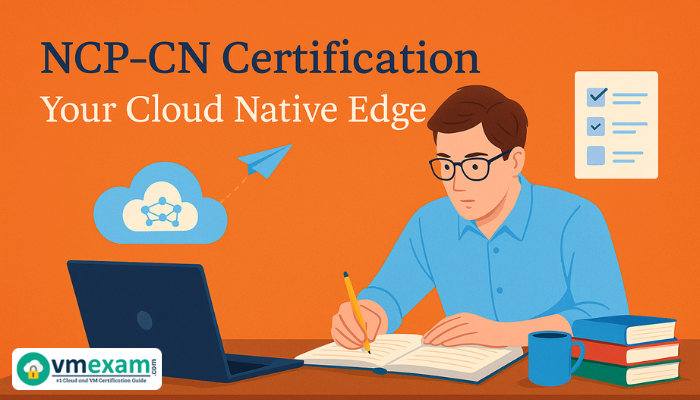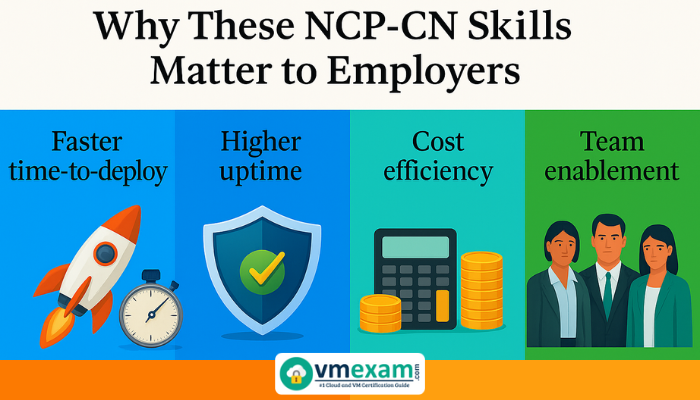
Cloud-native isn't just a buzzword anymore - it's the backbone of modern enterprise IT. As businesses race to modernize their infrastructure, professionals with proven expertise in Kubernetes platforms, cluster orchestration, and cloud-native lifecycle management are in high demand. The NCP-CN Certification - Nutanix Certified Professional - Cloud Native offers a concrete way to prove you have what it takes to thrive in this fast-paced ecosystem.
In this guide, we'll dive into the specific cloud-native skills that the NCP-CN exam validates, why they matter to employers, and how the right preparation tools, like NCP-CN Practice Exams, can help you demonstrate these capabilities confidently.
Skill #1: Cluster Deployment Mastery with NCP-CN Certification
A cornerstone of the Nutanix Certified Professional - Cloud Native (NCP-CN) credential is your proven ability to build Kubernetes clusters that are secure, scalable, and reliable. The NCP-CN certification validates your expertise in the “Manage Building an NKP Cluster” domain, which involves configuring services, networking components, and workloads within Nutanix Kubernetes Engine (NKE). You’re expected to understand container orchestration, helm charts, and persistent storage integrations - all critical in modern DevOps pipelines.
For employers, this cluster deployment knowledge ensures you're capable of handling production-grade environments from day one. Whether you’re deploying internal tools or managing customer-facing services, your certification proves you can design systems that are both flexible and fault-tolerant. In addition, mastering this skill reduces deployment bottlenecks, improves automation efforts, and enhances DevSecOps alignment.
Prepare thoroughly using NCP-CN practice exams that replicate real cluster-building scenarios. These practice tests align with Nutanix’s expectations and reinforce your ability to troubleshoot deployment issues under pressure, giving you the confidence to succeed in the real NCP-CN exam.
Skill #2: Environment Readiness Planning Validated by the NCP-CN Exam
Before any application can be deployed in a cloud-native infrastructure, environment preparation is essential. The NCP-CN Certification confirms you’re equipped to handle one of the most overlooked - but critical - stages of DevOps workflows: environment readiness. This competency is tested under the "Prepare the Environment for an NKP Deployment" section of the NCP-CN syllabus.
You'll need to demonstrate your knowledge of networking layers, subnets, firewall rules, and load balancer configurations. Additionally, managing storage policies, security groups, and access controls - especially via Role-Based Access Control (RBAC)- shows that you can prevent misconfigurations that lead to downtime or breaches.
Organizations rely on certified professionals who can configure cloud-native platforms like Nutanix Prism Central to meet enterprise-grade standards. The NCP-CN exam proves that you're not guessing - you’re implementing best practices from the ground up.
By using Nutanix NCP-CN sample questions, you can sharpen your understanding of this domain, helping you avoid rookie mistakes and meet system readiness objectives. For employers, your ability to plan and secure environments in advance translates to stability and long-term performance across the organization’s cloud-native applications.
Skill #3: Day 2 Operations and Lifecycle Management with NCP-CN
The real challenge in a cloud-native environment starts after deployment. That’s where Day 2 operations come in - monitoring systems, scaling workloads, applying patches, and maintaining uptime. The NCP-CN certification showcases your expertise in managing these critical tasks, particularly under the “Perform Day 2 Operations” domain of the NCP-CN exam.
This skill set includes setting up comprehensive observability tools, managing log collection, alerting mechanisms, and automating backups. You're also evaluated on your ability to troubleshoot performance bottlenecks, apply updates, and maintain security compliance in real-time environments. In short, you become the gatekeeper of system health and sustainability.
For businesses operating in regulated industries or high-demand sectors, lifecycle management isn’t optional - it’s essential. Your NCP-CN credentials prove that you can maintain peak system performance while aligning with SLAs and compliance requirements.
The Nutanix Certified Professional - Cloud Native practice exams offered on VMExam can simulate these operational challenges and help you fine-tune your decision-making under pressure. If you're aiming to work in Site Reliability Engineering (SRE), Platform Engineering, or DevOps, mastering Day 2 operations makes you a top-tier candidate in the modern tech landscape.
Skill #4: Fleet Management Across Multi-Cluster Environments with NCP-CN
As hybrid and multi-cloud strategies become the norm, the ability to manage clusters across multiple environments has become a high-demand skill. The NCP-CN certification proves that you’re ready for this challenge. It tests your expertise in the “Conduct NKP Fleet Management” domain, where scalability and orchestration take center stage.
You’ll learn how to use Nutanix tools like Prism Central to monitor, manage, and secure a fleet of clusters distributed across regions or environments. From rolling out updates across multiple clusters to maintaining consistent policy enforcement, this domain ensures you're capable of delivering governance at scale. It’s not just about keeping systems running - it’s about maintaining order across complexity.
The NCP-CN syllabus includes knowledge of cluster federation, resource quotas, fleet-wide auditing, and hybrid configurations. These are vital for organizations that operate across data centers and cloud providers. Employers seek professionals who can implement centralized visibility and control without increasing operational risk.
Utilizing NCP-CN sample questions and fleet management simulations will help you get familiar with real-world scenarios. The ability to manage infrastructure like a fleet of services is a core part of what makes the Nutanix Certified Professional - Cloud Native so valuable.
Why These Skills Matter to Employers?
Employers today are building systems that demand reliability, scalability, and security - all while maintaining agility.

The skills you validate with the NCP-CN certification directly translate to business benefits:
-
Faster time-to-deploy: Your knowledge of environment readiness and automation means shorter dev-to-deploy cycles.
-
Higher uptime: Strong operational skills reduce system failures and enhance monitoring.
-
Cost efficiency: Smart scaling and resource management minimize infrastructure wastage.
-
Team enablement: You bring repeatable, teachable processes that elevate team performance.
Hiring managers see NCP-CN not just as a certification, but as proof of your impact.
How Does the Cloud Native Certification Validate These Competencies?
Unlike theoretical certifications, the NCP-CN exam is deeply practical. It aligns closely with actual job responsibilities, thanks to its structure:
-
Prepare the Environment (~20%)
-
Build the Cluster (~30%)
-
Perform Day 2 Operations (~30%)
-
Conduct Fleet Management (~20%)
Each section in the Nutanix Certified Professional - Cloud Native exam syllabus mirrors what you’ll do on the job, ensuring you're certified not just in theory, but in execution.
Moreover, with 75 scenario-based questions to complete in 120 minutes, it’s a real-world stress test of your capabilities - exactly what employers want to see.
Conclusion: Demonstrate Your Skills with NCP-CN
The NCP-CN certification isn’t just another line on your resume - it’s a powerful statement. It shows you can plan, deploy, operate, and manage cloud-native systems in a production-grade environment. For engineers who want to stand out and for employers who need cloud-native mastery, this certification is the bridge between potential and performance.
